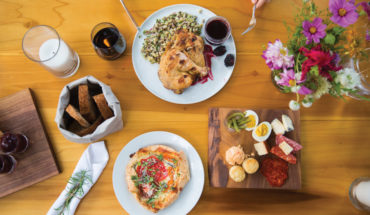by Liza Roberts
photographs by Lissa Gotwals
Raleigh’s hottest chef has no back burner.
Take one week in late July: Ashley Christensen’s cross-country commitments had her outside and up all night in Sonoma, Calif., cooking a pig for a winemaker event, then making a multi-course dinner for 250; returning home to introduce First Lady Michelle Obama to a packed Raleigh fundraiser; then in New York for meetings about her book-in-the-works. Through it all, she oversaw the 130 employees who keep her three-restaurant enterprise humming.
The woman is booked, chock-a-block jammed, because her commitments are serious and numerous: To her three Raleigh restaurants, to the Southern food community, to the Frankie Lemmon School for disabled children, and to a nationwide web of food lovers who all want her to headline their event, serve as a guest chef, and spread the gospel of Southern food done right. She is never not working.
Her restaurants include Poole’s Diner, which still inspires lines in the rain nearly five years after its doors first opened; Beasley’s, the fried chicken spot named one of the top 50 new restaurants in the nation this year by Bon Appetit; and Chuck’s, her pared-down burger spot. Her watering hole, Fox Liquor Bar, is in the basement around the corner.
For someone on the vanguard of the food scene, it’s interesting to note that food isn’t Christensen’s only subject. Food – for this 36-year-old James Beard award semifinalist, Iron Chef competitor, and creator of a fresh, imaginatively flavored, locally sourced Southern cuisine – isn’t even her main subject.
“I think that philanthropy, through restaurants, will ultimately end up being my life’s work,” she says, in a stolen moment of downtime, at ease in her daily uniform of T-shirt, shorts and Vans, her hair in its usual bun. Though Christensen is forthright, she is soft-spoken. “I feel an amazing empowerment and responsibility to do that.”
The seeds were sown in 2003, when Christensen, then a chef at the former Enoteca Vin on Glenwood South, decided to raise money for AIDS research by riding a bike to Washington, D.C. The stated goal for each participant was $2,500. Christensen set her own goal: “I was about to turn 26 years old, so I decided to raise $26,000.” Amazed to find that sum pile up quickly through donations from friends and patrons, she decided to double it and raised $56,000. “What it taught me was what an incredible responsibility it is to be at the center of a community, and to utilize that influence properly.”
Another thing became clear to her: Raleigh wanted to give, and Christensen could catalyze it. “The greatest thing about the success of the restaurants is that it allows us to be part of things we believe in,” she says of herself and her employees, whom she often includes in her charitable work. There is a lot of “we” in Christensen’s conversation.
Young giver
A focus on philanthropy is not typical from someone whose career is still in its early years. “Usually this is a late career move, to say: I’m going to be a philanthropist,” says John T. Edge, who runs the Southern Foodways Alliance and writes a food column for The New York Times. “Ashley got there early. Bill Gates made software for an entire career before he decided to become a philanthropist.”
Christensen’s contributions to The Southern Foodways Alliance, which documents and celebrates food culture in the South, are only partially represented by “the Ashley line” in the organization’s budget. (It’s a sum that more than pays an employee’s salary, Edge says). Through events like the Stir the Pot fundraisers she holds at her home near N.C. State University, Edge says Christensen has also raised invaluable awareness and enthusiasm for the food of the South. She’s done it in part by example, creating menus that combine traditional Southern comfort foods (like her famously swoon-worthy mac & cheese or fried chicken) with sophisticated, unexpected, veggie-intense combinations (red peas and celery leaf; baby carrots glazed with sorghum; Sneads Ferry clams with squash and tomatoes).
She has also shone a spotlight on the work of the SFA in the way those who know her best say she does everything: With the work ethic of an ant and the enthusiasm of a missionary.

Ashley Christensen prepares the beer can chicken at the Stir the Pot dinner at her home in Raleigh, NC. The series of dinners are fundraisers for the Southern Foodways Alliance.
At Christensen’s most recent Stir the Pot dinner, her signature SFA fundraiser, a capacity foodie crowd streamed up her driveway carrying potluck dishes, sipped blueberry gin cocktails, meandered through her house, and angled for a chat with the hostess. She worked. She impaled four dozen chickens on cans of Stroh’s. She stoked coals. She carried garbage bags. She checked the bar. She cleaned a spill. She served dinner.
Which is not to say she didn’t – or doesn’t – have fun, or insist that her guests do, too. When she’s standing still, Christensen is delighted to talk; she busily ensures everyone has enough food, enough drink, and if she’s not sure that’s the case, she might (as she pokes her beer-can chickens with one hand), thrust a handle of small-batch bourbon into yours with the other, and insist that you take a slug.
She wants her guests to have fun because she wants a group experience to emerge. She wants, in her restaurants and her charitable work alike, to create community.
“When you see people coming together and appreciating it, and opening up to a new experience that they didn’t have before, that’s a huge part of it all for me,” she says. “I do love cooking, but it’s a factor in this greater offering.”
Passionate player
“It’s part of the fabric of her being to give back and participate in life in ways that are incredibly meaningful,” says Lenora Evans, executive director of the Frankie Lemmon School foundation. “I’ve never met anyone more passionate about what she’s passionate about.”
Christensen, who serves on the school’s board, has been raising money to further its mission to educate children with special needs for 12 years. “Every time we turn around, she’s got another idea,” Evans says.
Christensen says an experience cooking for a Frankie Lemmon fundraiser several years ago crystallized the impact she could have. “I remember thinking that night: I’m too busy to do this right now. Selfishly, I’m just too busy…I’ve got seven days, and I need eight of them right now. And here I am…doing this.”
Her friend, the philanthropist Eliza Olander, who had organized the dinner, came into the kitchen. Somebody wants to see you, Olander said. “I rolled my eyes,” Christensen recalls, “and I walked out there, and it was all the little kids from the school.” Her voice catches; she stops, collects herself, and haltingly continues: “And they waited for me to get there. And then they did the hokey pokey, which is one of the first things they teach all the little kids to do. And it was completely overwhelming, and amazing. And I just remember never thinking about it the same way again. I can honestly say, since that day, I’ve never had another one of those days when I didn’t feel like I understood exactly why I needed to be exactly where I needed to be, doing what I was doing.”
You begin to realize, spending time with Christensen, her passion is, indeed, monumental.
It doesn’t hurt that she is also the Platonic ideal of a multitasker. Her business thrums today while she plans tomorrow. Her hands cook while her brain whirs. An onion becomes uniform, translucent dice while she cradles a phone, hashing out details for a fundraiser in Huntsville, Ala.: “Am I still bringing pickled green tomatoes?” She speaks up to be heard over Van Morrison’s Tupelo Honey, filling the kitchen airwaves: “I’ll bring a couple hundred.” Around her, prep cooks boil 14 pounds of elbow macaroni for that night’s estimated 50-plus orders of mac & cheese; shuck a bushel of corn; and combine 12 heads of garlic and 8 pounds of butter. They check their progress on yellow legal pads hanging on the wall near a white board with a scrawled message: Work hard, play hard.
Moments later, six-week peas Christensen snatches from the walk-in fridge become an impromptu marinated salad brimming with herbs as she gets ready for a Frankie Lemmon board meeting.
It all takes place at a fluid but staccato pace. “I try to regulate Ashley’s caffeine intake,” jokes Lara Spagnola, her assistant. “It gets really scary.”
Caffeine aside, another reason Christensen’s able to achieve so much is because she’s willing to take big risks. When Poole’s became an established, well-oiled machine and Christensen found herself waking up in the night with new ideas, she executed not one, but all three of them. At once. When faced with the task of writing a business plan to apply for the Small Business Administration loan she needed to open Beasley’s, Chuck’s, and Fox Liquor Bar, she wrote the SBA a story instead. The agency backed her $600,000 loan.
Looking forward
On a summer weekday afternoon at Poole’s, the downtown restaurant, which doesn’t serve lunch, is dark. Christensen has just returned from another impossible series of trips. The only action in the place, which is a riot of bustle at night, is some orderly dinner prep in the kitchen. Tables sport cases of wine (there is no storage); her assistant taps out email on a laptop, and amazingly, Christensen has a moment to reflect.
 “I think I might have another restaurant left in me,” she says with a laugh that means even she knows the idea sounds, in the heat of her overtaxed moment, absurd. First, though, she’s writing a book. A cookbook about entertaining and all that entails: cocktails, scenery, music, seasons.
“I think I might have another restaurant left in me,” she says with a laugh that means even she knows the idea sounds, in the heat of her overtaxed moment, absurd. First, though, she’s writing a book. A cookbook about entertaining and all that entails: cocktails, scenery, music, seasons.
Someone comes to the restaurant door, a friend with a box of homegrown figs. It’s a perfect, unscripted, seasonal Kodak moment that would fit perfectly in the book she’s planning: A visible manifestation of the bounteous community she has created. Because people do that: Bring her things. Figs, peas, photographs.
They want to join in, to participate in her world. It’s a magnetic force created by force of will and vision, and one she’s more than happy to deploy inside and outside her restaurants. It has stretched her, this power she has built, to become more social, she says, a better communicator. Which has enabled her to bring others along for the fundraising ride. And it can’t help but boost her restaurants’ success, to have so many folks feel they’re all on her short list.
That regular gathering is manifested in the bustling, celebratory, inclusive zing of Poole’s at full throttle. It may top her list of favorite things: “I’m completely, totally in love with all that,” she says. “But this work…” she gestures broadly with her hands to indicate her charitable efforts, “this work is the best I am.”





